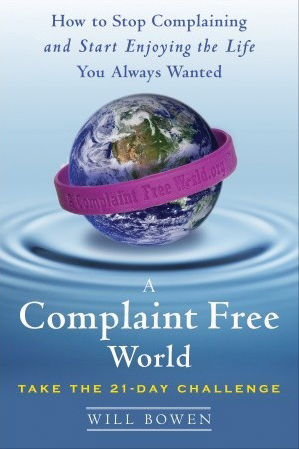In 2006, Will Bowen, lead minister at One Community Spiritual Center in Kansas City, Mo., decided to challenge himself and his congregation to go 21 days without complaining, criticizing or gossiping. Although a man of the cloth, Bowen conceived of the Complaint Free Challenge as a “nonreligious human transformation movement.”
Through his own study, Bowen had hit on one of the really big ideas that run through so many of the books I’ve written about in the PhilosophersNotes: When we change our words, we change our thoughts. And when we change our thoughts, we change our lives. Bowen realized that one key way we could change our words is by cutting down on our griping.
“Complaining is focusing on what we don’t want,” Bowen told the church’s office manager when he proposed the project. “It’s talking about what’s wrong, and what we focus our attention on expands. So we want to help people eradicate complaining from their lives.”
“Complaining is focusing on what we don’t want. It’s talking about what’s wrong, and what we focus our attention on expands. So we want to help people eradicate complaining from their lives.”
So Bowen designed the Challenge. He defined complaining as expressing discontent, pain or grief with the way things are, and he devised a few simple rules for those who participated:
Every participant would wear a purple rubber bracelet on their wrists. When a participant would catch himself complaining, criticizing or gossiping, he’d switch the bracelet to the other wrist and restart the 21-day count. Bowen made bracelets part of the Challenge so participants would have an easy visual reminder and a source of positive reinforcement.
Ten million (yes, 10 million!) purple bracelets later, he’s gone a long way toward creating a complaint-free world. Bowen himself went through several bracelets on his own personal journey to give up grumbling. “I moved my bracelet so many times that I broke three of them before making it 21 consecutive days.”
My wife, Alexandra, and I have been playing the 21-Day Complaint Free Challenge game for some time. After shocking myself in the first few days with how much I grumble, I almost made it through one whole day without a complaint. I proudly announced to Alexandra, “Hey, I’ve almost made it!” Then, not two minutes later, I complained about the bath mat — the bath mat! — being a little weird.
If you want to learn more about the Challenge or get your own bracelet, visit www.acomplaintfreeworld.org. Meanwhile, here are some of the big ideas from Bowen’s book, which is a really inspiring and practical look at how we can reformat our mental hard drives and create more happiness in our lives.
Moving Beyond Dissatisfaction
When Bowen started the 21-Day Complaint Free Challenge, he would get feedback like this email: “But every great thing in our country began with people complaining . . . think about Thomas Jefferson and Martin Luther King!”
Bowen realized that, in some respects, he agreed with the email writer. “The first step toward progress is dissatisfaction. But if we stay in dissatisfaction, we never move forward to brighter vistas,” he writes. “Were the great leaders of the United States also great complainers? I’d have to say no. These important men and women allowed dissatisfaction to drive them to great visions, and their passion for these visions inspired others to follow them.”
Being complaint free isn’t about pretending there aren’t any challenges in our lives or in the world. And Bowen acknowledges that the expression of pain and grief is necessary in the face of traumatic events.
Complaining is just “our default setting,” Bowen says. “It’s what we do.”
But he reminds us that the majority of the time “our complaints are not sourced by such deeply painful experiences,” and “things are not really bad enough to warrant expressing grief, pain or discontent.” Complaining is just “our default setting,” he says. “It’s what we do.”
So when something is dissatisfying, but doesn’t rise to the level of traumatic event, our goal is to recognize what’s wrong — and then focus on what we can do about it.
Shutting Down the Complaint Factory
There are four stages to building competence in any area, notes Bowen. “In becoming a complaint-free person, you will go through each of them and, sorry, you can’t skip steps.”
The first stage is Unconscious Incompetence, in which we aren’t even aware of the change we need to make or the skill we lack. Basically, we have no idea about how often we complain. Bowen notes that, ironically, many of the purple-bracelet requests he receives come from people in this stage. “Please send me purple bracelets right away,” they write. “Everybody I know complains all the time.”
This stage is followed by Conscious Incompetence, in which we become uncomfortably aware (conscious) of just how often we complain (are incompetent). And, trust me, it’s a lot more often than you think. I consider myself a pretty positive person, and I was shocked at just how much I complained during the first several days of the Challenge. Most people give up during this phase because they feel overwhelmed, writes Bowen. He counsels readers to remember that failing is inevitable at first, but it will get easier, and the payoff is worth the effort.
The next stage is Conscious Competence. Here, Bowen explains “you begin to be aware of everything you are saying. You are moving your bracelet far less frequently because you are very careful when you speak.”
As you hit this stage, don’t worry if you struggle for words, or don’t know how to replace habitual complaining with something else. Periods of silence are typical as you transition to less negative language. Lean into the silence, he suggests, and keep marking your progress.
The final stage is Unconscious Competence. This is when you have literally rewired your brain such that you naturally show up Complaint Free. “You will find that your mind no longer produces the deluge of unhappy thoughts you used to live with. Because you are not speaking them, you have no outlet for them, and the complaint factory in your mind closes down.”
Less Griping, More Happiness
Invest the months it takes to develop the skill of complaint-free living, promises Bowen, and you’ll find that “you are a different person . . . a happier person.” And you’ll be joining millions of others who are committed to creating a happier, complaint-free world.
Download a PDF summary of A Complaint Free World.
About the Author

 Will Bowen is the lead minister of One Community Spiritual Center in Kansas City, Mo. In July 2006, he suggested that his congregation use purple bracelets to monitor their success at eliminating complaining from their lives. His idea exploded around the world, and more than 10 million purple Complaint Free bracelets have been sent to people in more than 106 countries.
Will Bowen is the lead minister of One Community Spiritual Center in Kansas City, Mo. In July 2006, he suggested that his congregation use purple bracelets to monitor their success at eliminating complaining from their lives. His idea exploded around the world, and more than 10 million purple Complaint Free bracelets have been sent to people in more than 106 countries.
Big Ideas
Discover more practical wisdom from thought leaders by exploring our Big Ideas department.





This Post Has 0 Comments